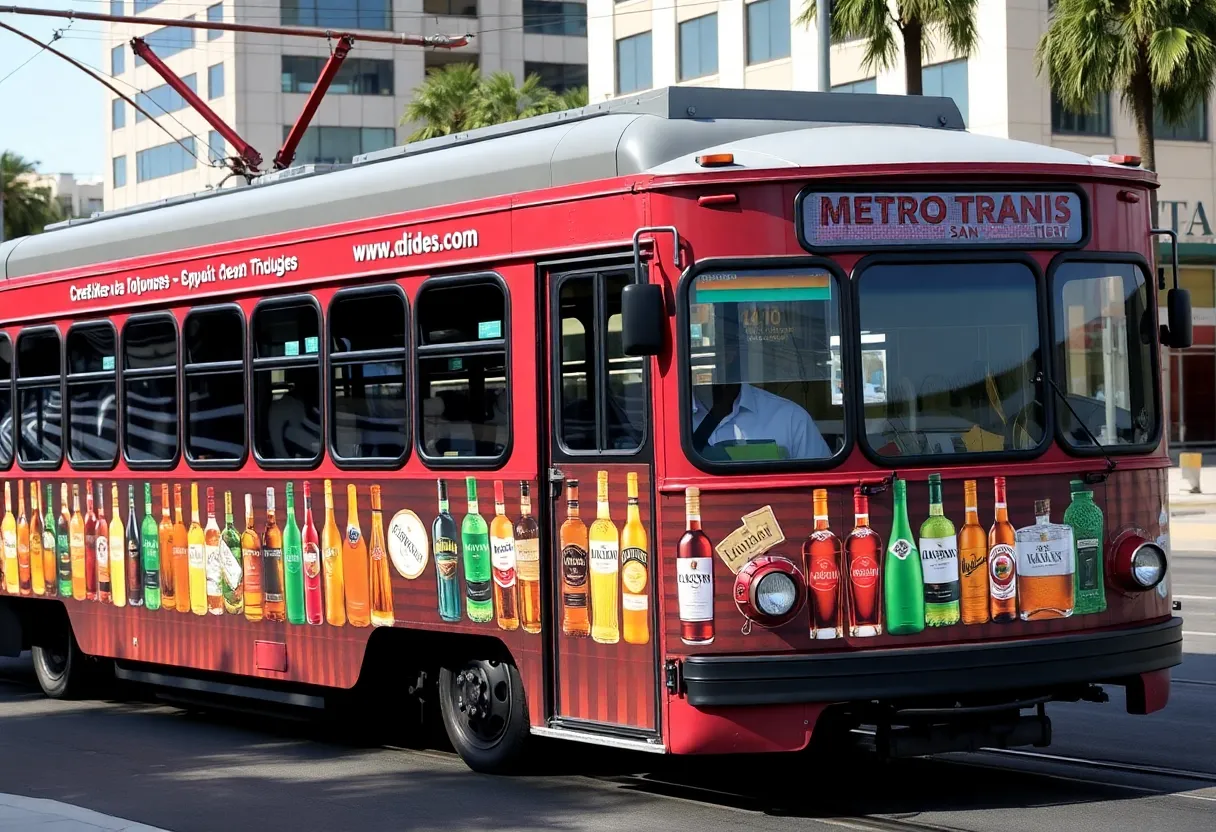News Summary
The Metropolitan Transit System (MTS) in San Diego has voted to lift its long-standing ban on alcohol advertisements on trolley cars and bus shelters. The decision aims to increase revenue in response to projected deficits of $100 million. Although a previous pilot project generated disappointing earnings, MTS officials reported no complaints about the ads and plan to include responsible drinking messages. The agency is also considering other financial measures, including a sales tax hike, to address budget challenges.
San Diego – The Metropolitan Transit System (MTS) board has voted 9-4 to permanently lift a long-standing ban on alcohol advertisements on trolley cars and bus shelters, a decision made on June 26. This move is part of an effort to increase revenue as the agency faces projected deficits of $100 million in future years.
The ban on alcohol advertisements was first implemented years ago but was temporarily lifted during a two-year pilot project. The pilot yielded disappointing results, generating only $67,000—far below the anticipated $200,000. Despite the lower income, MTS officials reported that there were no complaints about alcohol advertisements during the pilot, which included advertising from brands such as Breckenridge Distillery and Dios Azul Tequila. Advertisers will also feature responsible drinking messages, including encouragement to avoid drinking and driving by utilizing the trolley services.
In light of the current budget woes, MTS is considering the possibility of placing a sales tax hike on the November 2026 ballot as another measure to address financial shortfalls. During the heated discussions surrounding the alcohol ad ban, some board members expressed concerns regarding the potential effects these ads could have on low-income neighborhoods. However, MTS officials stated that the pilot project results indicated minimal presence of ads in such areas, with only five out of sixty ads located in low-income neighborhoods.
Despite the concerns, various board members expressed support for the new revenue model. Sean Elo-Rivera, a San Diego City Council member, applauded the decision as a positive step toward diversifying revenue streams for the MTS. Conversely, board member Mark Fleming, representing the Coronado City Council, criticized the program, stating that the effort might yield insufficient returns. Patricia Dillard, a board member from La Mesa, remained optimistic about future revenue increases resulting from the new advertising space.
Opposition to lifting the ban included votes against it from Henry Foster, a San Diego City Council member, Mark Fleming, County Supervisor Monica Montgomery Steppe, and Chula Vista Mayor John McCann. Foster specifically highlighted the need for more comprehensive studies regarding the potential adverse impacts on low-income communities from alcohol advertisements.
In discussing the potential for future collaboration with advertisers, MTS Director of Marketing and Communications Mark Olson noted that familiarity with the advertisement spaces could lead to increased revenues over time, despite the initial pilot project’s lackluster performance. The MTS has also negotiated an agreement with the city wherein 45% of the alcohol advertisement revenue accrued within San Diego will be allocated to the city’s finances.
Out of the $67,000 raised during the pilot phase, MTS retained approximately $37,000 after the revenue-sharing agreement with the city. Notably, alcohol advertisements will not be placed in regions such as Poway or Coronado, as these areas lack MTS bus shelters or trolley lines.
As MTS anticipates future financial challenges with significant budget deficits looming, the decision to lift the alcohol advertisement ban represents a strategic attempt to generate new revenue streams and ensure the continued operation of public transit services in the San Diego area.
Deeper Dive: News & Info About This Topic
HERE Resources
Additional Resources
- San Diego Union Tribune: Expect More Alcohol Ads on San Diego Transit
- AdWeek: Budweiser U-Turns on Regional Super Bowl Plans
- Beverage Daily: Big Beverage Ads at Super Bowl LIX
- Wikipedia: Advertising
- NBC San Diego: Official Vodka of SDSU Athletics
- Google Search: Alcohol Advertising Effects

Author: STAFF HERE SAN DIEGO WRITER
The SAN DIEGO STAFF WRITER represents the experienced team at HERESanDiego.com, your go-to source for actionable local news and information in San Diego, San Diego County, and beyond. Specializing in "news you can use," we cover essential topics like product reviews for personal and business needs, local business directories, politics, real estate trends, neighborhood insights, and state news affecting the area—with deep expertise drawn from years of dedicated reporting and strong community input, including local press releases and business updates. We deliver top reporting on high-value events such as Comic-Con International, San Diego County Fair, and San Diego Pride Festival. Our coverage extends to key organizations like the San Diego Regional Chamber of Commerce and United Way of San Diego County, plus leading businesses in biotechnology, healthcare, and technology that power the local economy such as Qualcomm, Illumina, and Scripps Health. As part of the broader HERE network, including HEREAnaheim.com, HEREBeverlyHills.com, HERECostaMesa.com, HERECoronado.com, HEREHollywood.com, HEREHuntingtonBeach.com, HERELongBeach.com, HERELosAngeles.com, HEREMissionViejo.com, and HERESantaAna.com, we provide comprehensive, credible insights into California's dynamic landscape.


